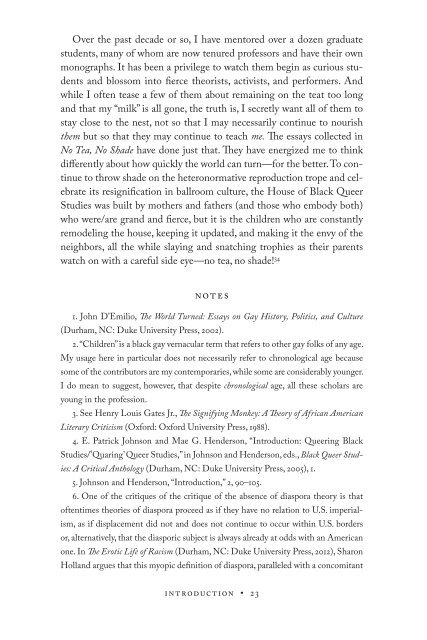No Tea
89AS6wvrf
89AS6wvrf
You also want an ePaper? Increase the reach of your titles
YUMPU automatically turns print PDFs into web optimized ePapers that Google loves.
Over the past de cade or so, I have mentored over a dozen gradu ate<br />
students, many of whom are now tenured professors and have their own<br />
monographs. It has been a privilege to watch them begin as curious students<br />
and blossom into fierce theorists, activists, and performers. And<br />
while I often tease a few of them about remaining on the teat too long<br />
and that my “milk” is all gone, the truth is, I secretly want all of them to<br />
stay close to the nest, not so that I may necessarily continue to nourish<br />
them but so that they may continue to teach me. The essays collected in<br />
<strong>No</strong> <strong>Tea</strong>, <strong>No</strong> Shade have done just that. They have energized me to think<br />
differently about how quickly the world can turn— for the better. To continue<br />
to throw shade on the heteronormative reproduction trope and celebrate<br />
its resignification in ballroom culture, the House of Black Queer<br />
Studies was built by mothers and fathers (and those who embody both)<br />
who were/are grand and fierce, but it is the children who are constantly<br />
remodeling the house, keeping it updated, and making it the envy of the<br />
neighbors, all the while slaying and snatching trophies as their parents<br />
watch on with a careful side eye—no tea, no shade! 34<br />
notes<br />
1. John D’Emilio, The World Turned: Essays on Gay History, Politics, and Culture<br />
(Durham, NC: Duke University Press, 2002).<br />
2. “ Children” is a black gay vernacular term that refers to other gay folks of any age.<br />
My usage here in par tic u lar does not necessarily refer to chronological age because<br />
some of the contributors are my contemporaries, while some are considerably younger.<br />
I do mean to suggest, however, that despite chronological age, all these scholars are<br />
young in the profession.<br />
3. See Henry Louis Gates Jr., The Signifying Monkey: A Theory of African American<br />
Literary Criticism (Oxford: Oxford University Press, 1988).<br />
4. E. Patrick Johnson and Mae G. Henderson, “Introduction: Queering Black<br />
Studies/‘Quaring’ Queer Studies,” in Johnson and Henderson, eds., Black Queer Studies:<br />
A Critical Anthology (Durham, NC: Duke University Press, 2005), 1.<br />
5. Johnson and Henderson, “Introduction,” 2, 90–105.<br />
6. One of the critiques of the critique of the absence of diaspora theory is that<br />
oftentimes theories of diaspora proceed as if they have no relation to U.S. imperialism,<br />
as if displacement did not and does not continue to occur within U.S. borders<br />
or, alternatively, that the diasporic subject is always already at odds with an American<br />
one. In The Erotic Life of Racism (Durham, NC: Duke University Press, 2012), Sharon<br />
Holland argues that this myopic definition of diaspora, paralleled with a concomitant<br />
Introduction • 23


